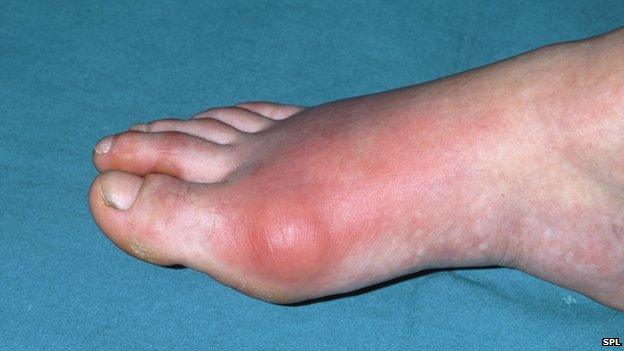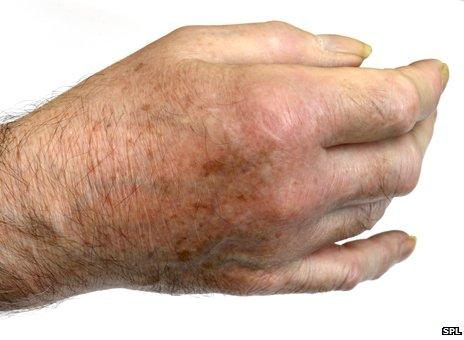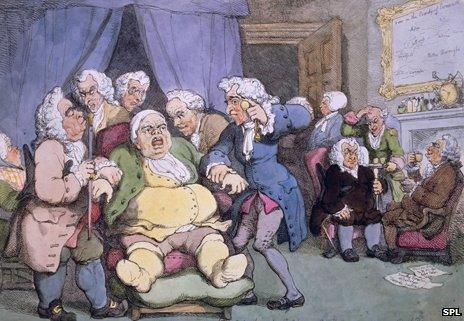Gout: Why I don't find it funny at all
- Published

Gout is traditionally associated with port-quaffing Victorian gentlemen of excess and the obese Henry VIII. But for those who bear no resemblance to either, it's no laughing matter.
"Ah, yes," said the GP. "It's probably gout."
I almost burst out laughing.
Gout? Isn't that something that affects ageing soaks - red-faced Dickensian gluttons, paying the price for years of uncompromising excess?
Apparently not. Well not always. Certainly I can be red-faced at times, and I'll never fit comfortably into Mick Jagger's trousers, but I also go jogging on a fairly regular basis, eat a fairly balanced diet, don't smoke and indulge in alcohol much less than the average bloke bumping up to their sixth decade.
In fact, I had gone to the doctor thinking that the cause of my discomfort was something much more glamorous - a stress fracture of the metatarsal, caused by playing too much tennis.
"Sometimes it is nothing to do with a poor lifestyle," the GP continued. "It can just be down to a poor metabolism, it can just be bad luck."
I wasn't convinced, and got him to agree to send me for an X-ray, which revealed that I was wrong about the stress fracture.
But bad luck it was, and extremely painful bad luck at that. Gout has been described, anecdotally at least, as "male childbirth".

Certainly, the night before I went to my doctor was a long one - even the pressure of resting my foot on the bed sheets was too much to bear.
I tried every last sleeping position I could think of. Finally I got some fitful sleep by sleeping halfway down the bed with my feet dangling in mid-air.
Being diagnosed with gout is - to judge by the responses of those who don't have it - one of the few bona fide comedy conditions that a human can still develop.
Most people don't make light of cancer, or have a store of wisecracks about heart disease on the tip of their tongue. Gout, though, is a different matter.
I received a rather thoughtful text from my boss after I sent in a message explaining my absence from work. "Sorry to hear about your medical problem," it read.
Then, a couple of painful twinges later, a follow up: "Does it involve any amputations?"
Back at work, another colleague expressed amazement that I should have developed the condition: "Isn't that something that only affects old, miserable blokes?"
The thing is, it's not really very funny. Apart from the obvious discomfort, there are medical studies to suggest that gout alone is a risk factor for heart disease and diabetes.
The classic symptom of gout is pain and swelling in the joints. It often affects the big toe but can affect larger joints such as the knee, and is caused by a build-up of uric acid crystals in the joint.
Uric acid is a waste product which is formed when the body breaks down chemicals in its cells known as purines. It is usually removed from your system via the kidneys, but people with gout cannot do this efficiently, and that's when the crystals start to form.

This 1808 cartoon by Rowlandson shows the traditional image of gout sufferers
Despite its 19th Century image, gout is on the increase. A study found that the number of hospital admissions for the condition increased 7.2% per year throughout the noughties.
It should be controllable with drugs, and drinking water helps, but apparently depression can be a risk for people with gout, often because of the restricted movement they have during an attack.
More depressing for me was the list of goodies I ought to avoid, thrown up by even the most cursory surf of the web - red meat, asparagus, spinach and mushrooms for a start.
And drowning my sorrows was out. Beer and whisky were high on the proscribed list of banned treats.
Then there is the raised risk of kidney stones, which, I am told, can also be as painful as giving birth - there seems to be a developing riff here.
For those of you still tempted to dismiss gout as a good reason to have a giggle, I'll leave the final - somewhat jaundiced - word to a contributor who posted a comment at the bottom of an online newspaper article about the rise in cases:
"Gout is the final metabolic warning that the hooded man with the sickle is coming to get you."
Follow @BBCNewsMagazine, external on Twitter and on Facebook, external
On a tablet? Read 10 of the best Magazine stories from 2013 here
- Published28 September 2012